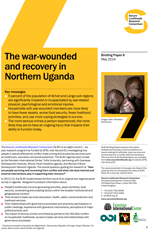In 2012/13, the Secure Livelihoods Research Consortium (SLRC) implemented the first round of an original sub-regional panel survey in northern Uganda aimed to produce data on livelihoods, access to and experience of basic services, exposure to shocks and coping strategies, people’s perceptions of governance, and the impact of serious crimes committed during the Government of Uganda and Lord’s Resistance Army conflict.
Main findings include:
- 5 percent of the population of Acholi and Lango sub-regions is impaired or incapacitated by war-related physical, psychological and emotional injuries.
- Households with war-wounded members are more likely to have fewer assets, worse food security, fewer livelihood activities, and use more coping strategies to survive.
- The more serious crimes a person experienced, the more likely they are to have an ongoing injury that impacts their ability to function today.







